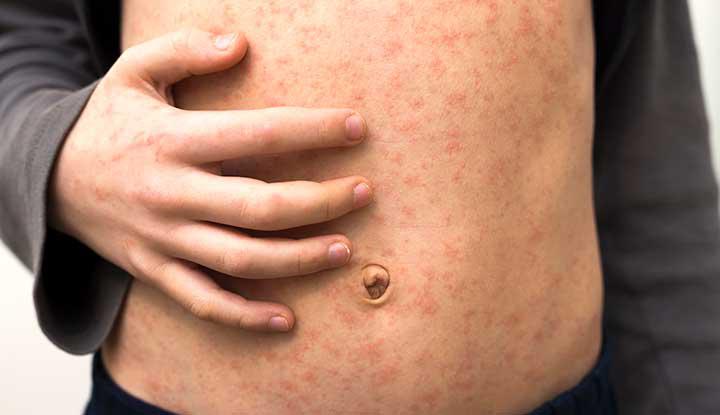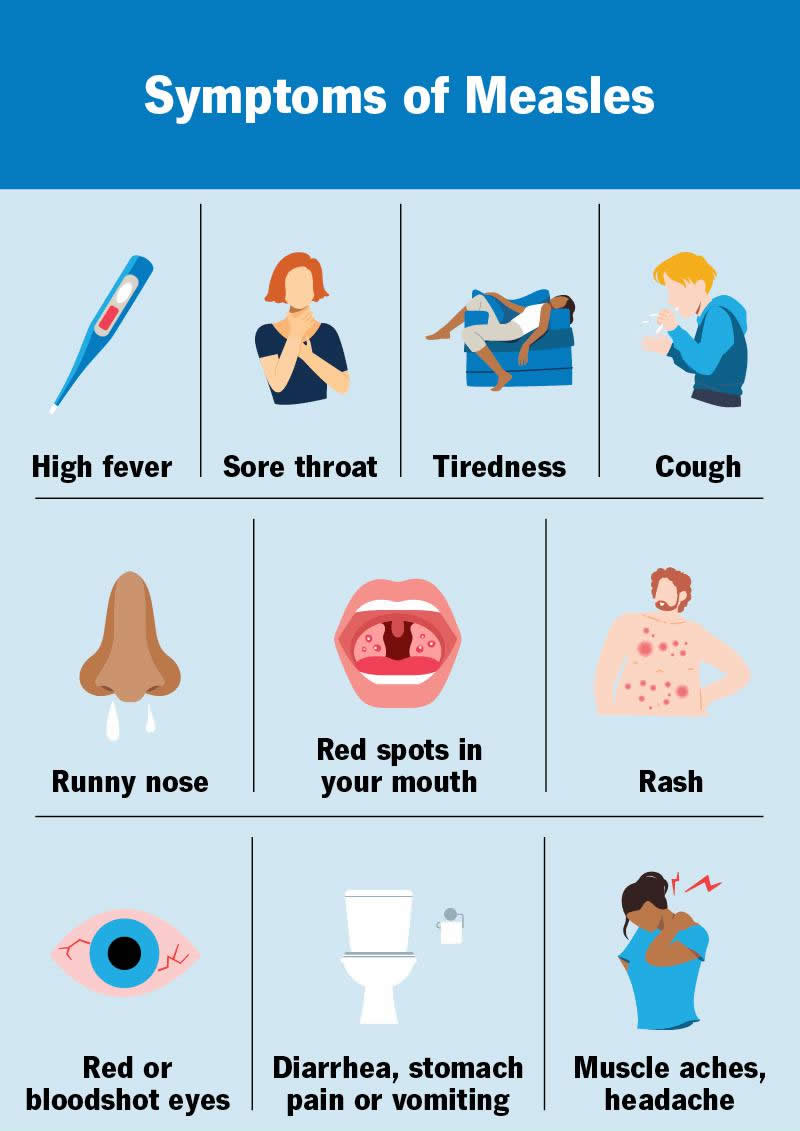Measles (Rubeola)
Measles is a highly contagious disease that causes a high fever, rash, cough and red eyes. It can lead to life-threatening complications, like brain inflammation and pneumonia. It’s caused by a virus. Getting the measles vaccine is the best way to prevent getting and spreading measles.
What Is Measles?

Measles is a highly contagious illness caused by a virus. It causes a widespread rash and flu-like symptoms. But measles isn’t just a rash. It can make you severely ill and lead to life-threatening complications like brain inflammation and pneumonia. It can also make you more likely to get sick with other infections.
Before it was part of routine childhood immunizations, measles caused millions of deaths around the world. There are still cases in the U.S. every year. There’s no specific treatment or cure.
Measles is also called rubeola, 10-day measles or red measles. It isn’t the same as German measles (rubella).
Symptoms and Causes

Symptoms of measles
Measles symptoms include:
- High fever
- Barky cough
- Red or bloodshot eyes
- Runny nose
- Tiredness
- Red spots with white centers in your mouth (Koplik’s spots)
- Rash
- Digestive symptoms, like diarrhea, stomach pain and vomiting
- Sore throat
- Muscle pain
- Headache
Measles symptoms don’t appear all at once. A fever, cough, runny nose and red eyes may appear first. Koplik’s spots might appear two to three days later and fade when the rash begins. The rash appears three to five days after your initial symptoms start. A high fever may develop with the rash.
What do measles look like?
The measles rash usually starts as flat spots on your face. On lighter skin, it appears red. On dark skin, it could appear purple or darker than the skin around it, or it might be hard to see.
The rash spreads downward over your neck, chest, back, arms, legs and feet. The spots might blend together as they spread. There might be some areas that are raised bumps and some that are flat. It doesn’t usually itch.
Measles causes
Measles virus (genus Morbillivirus) causes measles. It’s an airborne disease, which means it spreads through the air when an infected person breathes, coughs, sneezes or talks. The airborne droplets can remain in a room for two hours even after the person with measles is gone. Droplets can also land on surfaces you touch.
Measles can spread by:
- Being around someone with measles, including talking, sharing food or drinks, kissing, shaking hands or hugging
- Touching a surface or object containing the virus and then touching your mouth, nose or eyes
- Vertical transmission — from a pregnant woman to the fetus or baby during pregnancy, delivery or while breastfeeding
Is measles contagious?
Yes, measles is highly contagious, which means it spreads easily from person to person. Experts estimate that if one person in a room of unvaccinated people has measles, 9 out of 10 people in the room will catch it. You’re contagious about four days before you develop a rash until about four days after the rash starts.
Risk factors
You’re at higher risk for severe complications from measles if you:
- Are older than 20 or younger than 5
- Are pregnant
- Have a weakened immune system (immunocompromised)
Measles complications
Complications of measles can be mild to life-threatening. They include:
- Ear infections
- Dehydration from severe diarrhea
- Bronchitis
- Laryngitis
- Pneumonia
- Blindness
- Brain swelling (encephalitis)
- Subacute sclerosing panencephalitis (SSPE), a rare but fatal nervous system infection that happens years after a measles infection
- Measles inclusion body encephalitis (MIBE), brain inflammation that can happen — most often in people with compromised immune systems — days to years after having measles
- Death
If you have measles while pregnant, your baby could be born early (preterm birth) or have low birth weight.
Diagnosis and Tests
How doctors diagnose measles
A healthcare provider might be able to diagnose measles based on your health history, a physical exam and the appearance of the rash. To confirm a diagnosis, they might use:
- Blood tests
- Swabs from your nose or throat
- Urine (pee) tests
Management and Treatment
Is there a cure for measles?
There’s no cure and no specific treatment for measles.
If you’re treated in a hospital, a healthcare provider might give you vitamin A to reduce your risk of serious complications. But you shouldn't treat yourself with vitamin A without a healthcare provider watching to avoid organ damage. Too much vitamin A can lead to a serious condition called vitamin A toxicity. Vitamin A won't cure or prevent measles.
How long does measles last?
Measles usually lasts 10 to 14 days if you don’t have complications.
When should I see my healthcare provider?
Talk to your healthcare provider if:
- You have questions about vaccination
- You’ve been exposed to measles (they might be able to give you immunoglobin (antibody) treatment to reduce your risk of getting sick)
- You want to check your levels (titers) of measles antibodies to see if you have immunity to measles
Go to the emergency room if you experience:
- Difficulty breathing
- Chest pain
- Sensitivity to light
- Neck stiffness
- Severe headache
- Confusion
- Severe vomiting or diarrhea
Outlook / Prognosis
What can I expect if I have measles?
Measles can cause severe illness. About 2 out of every 5 people with measles are hospitalized.
Even after you’ve recovered, you might be more likely to get sick with other infections. This is because measles often destroys immune system cells responsible for remembering past infections that you’d developed immunity to (“immune amnesia”).
You can also develop life-threatening complications months or years after having measles, especially if you have a weakened immune system.
Do you have to isolate with measles?
Yes, you should isolate for four days after the rash appears if you have measles. You should wear an N95 mask, and so should healthcare providers and anyone who’s helping care for you. Ask your provider when it’s OK to be around other people and return to work or school.
Can you treat measles at home?
Ask your healthcare provider (or your child’s) how you can safely manage symptoms at home. They might suggest:
- Taking acetaminophen or NSAIDs for aches, pains or fever
- Getting plenty of rest
- Drinking lots of fluids
- Gargling with salt water
Prevention
Can you prevent measles?
The measles vaccine is extremely effective at preventing measles. To be fully protected, you need two doses of either:
Most people get the MMR or MMRV shots in childhood, but you can get them as an adult, too.
Can you get measles if you had the vaccine?
It’s unlikely that you’ll get measles if you’ve received both doses of the vaccine. Receiving only one dose is less effective at preventing illness.
A note from Wockr
Measles once infected nearly every child in the U.S. Thanks to public health efforts, it’s now eliminated (no longer spreads regularly) in the U.S. But outbreaks still happen, and people still die from measles. If people stop getting the measles vaccination, it can start spreading widely in the U.S. again. If you think you’ve been exposed to measles, talk to a healthcare provider. They can let you know how to manage your symptoms and if there are any ways to reduce your risk of severe illness.